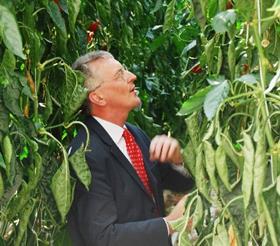
The UK needs to change the way food is produced and processed if it is to ensure an affordable, sustainable supply in the future.
That was the view of UK environment, food and rural affairs secretary Hilary Benn, speaking at the launch of the country's first Food Security Assessment yesterday (10 August) at Thanet Earth in Kent, who also pointed at a need to reduce greenhouse gas emissions and adapt to climate changes both in the UK and overseas.
'Last year the world had a wake-up call with the sudden oil and food price rises. While we know the price of our food, the full environmental costs and the costs to our health are significant and hidden,' Mr Benn said. 'We need a radical rethink of how we produce and consumer our food.
'Globally, we need to cut emissions and adapt to the changing climate that will alter what we can grow and where we can grow it. We must maintain natural resources – soils, water and biodiversity – on which food production depends. And we need to tackle diet-related ill health that already costs the NHS and the wider economy billions of pounds each year,' he added.
The UK Food security Assessment is part of a package that also includes Food 2030 (an online discussion seeking views on the future of the UK's food system), 'Food Matters' One year on', and draft indicators for the sustainability of the food system.
'Our food strategy will need to cover all aspects of our food – production, processing, distribution, retail, consumption and disposal,' Mr Benn said. 'And that includes the impact on our health, on the environment and future productivity, and on how we deal with food waste.'
Following the launch of the UK's assessment, Dr Friedhelm Schmider of the European Crop Protection Association (ECPA) provided a wider European perspective on the issue of increasing food production without exacerbating climate change.
'Sustaining our food supply begins with agricultural policies which understand scientific farming and the natural pressures faced by agriculture,' he said. 'However, European legislation might be pulling us in another direction.
'Recent legislation on pesticides – a key element of production in farming systems – will ban substances that have been rigorously tested and demonstrated to be below the strictest risk-assessment thresholds applied anywhere in the world,' he noted. 'EU agricultural policies should reconnect to the reality of agriculture – and the real and pressing needs of humanity.'
Mr Schmider added that farmers must be kept up to date with the latest technological advances, with future changes in temperature and precipitation expected to alter pest and disease patterns. This in turn could make crops more vulnerable, affecting volume, price and quality of food supply.
'Generating sufficient yields to feed the growing global population – which is expected to reach 9bn by 2050 – will increasingly rely on science and innovation, including the availability of modern pesticides,' he said.






No comments yet